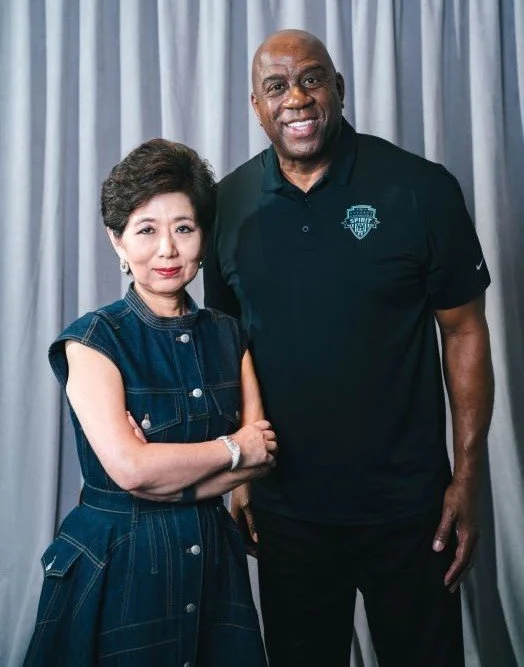Beyond Words: Modeling Leadership
Michelle Kang and Magic Johnson
“Always teach, sometimes use words.”
This quote resonated with me immediately. I was listening to a podcast from the Flow Research Collective, and one of the guests shared this quote, although he didn’t remember who had originally said it. A Google search revealed that it’s often attributed to St. Francis of Assisi. I love it because it speaks to how our behavior and actions can be a model for those who look to us for guidance.
An interview I saw recently on CBS This Morning with Magic Johnson and Michelle Kang spoke directly to this expression in action. Magic has joined Kang as a minority owner of the Washington Spirit of the National Women’s Soccer League. Admiring the work Kang has done to elevate women’s soccer around the globe, Magic expressed how important it was to be an example for others who are striving to achieve their dreams.
Kang said she hopes to draw from Johnson's vast experience of turning a sports franchise into a dynasty. "Those lessons and wisdom and experience are something that we absolutely need, and we are looking forward to learning from him," Kang said.
The notion that we can impact others moreso by what we do than by what we say is powerful testament to the old adage: “actions speak louder than words.”
Below is a portion of a post from a couple of years ago about the effectiveness of an empowering leader.
Unleashing Leadership
In Unleashed, authors Frances Frei & Anne Morriss, offer a new definition of leadership:
Leadership is about empowering other people as a result of your presence—and making sure that impact continues into your absence.
The perspective shift they’re advocating is a pivot away from focusing on ourselves—our talents, strengths, vision, failings, and other consuming leadership facets, to that of unleashing other people’s potential. This does not mean that we don’t pay attention to our leadership development—just not as our sole focus. Our leadership effectiveness will be apparent when those we lead are wildly successful.
The question the authors pose is: how much time do we spend thinking about ourselves and our needs versus other people and their needs?
Frances and Morriss contend that it is our presence—rooted in trust, love, and belonging—that empowers others. The essence of that presence remains constant so that when we are physically absent, others continue to soar. Their concept of being “Ambassadors of Other People’s Awesomeness (OPA)” is a particularly uplifting exercise where we habitually let people know what gifts or talent we see in them. I’ve witnessed how empowering this kind of recognition can be, when, at the end of my cohort coaching sessions, we ask each person to express a strength they see or a significant impact they’ve experienced directly to a colleague. Such a practice creates and releases a powerful energy of affirmation and possibility.
As an empowering leader, Frances and Morriss assert that we should:
Risk making other people the heroes of our leadership story
Take radical responsibility for other people’s experiences
Believe in a better version of individuals
Release the energy of possibility
Leaders who empower others make space for increased confidence in their capabilities and potential. Empowerment expects that people will take initiative, lean into their creativity, and take ownership—leading to greater fulfillment and engagement.
We might ask ourselves: Aside from the standard metrics of success, how do people experience our leadership?
Connecting with the worldview of Unleashed brings me full circle to my posts about the heroine’s journey, distinctive in its collaborative, empowering ways of courageously moving forward for ourselves and others.


